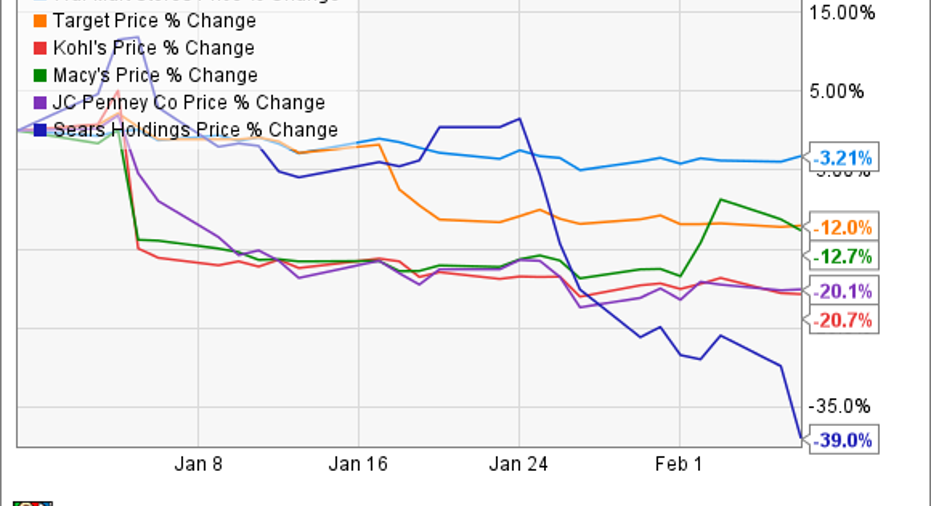Retail Stocks: What to Watch in 2017

2017 has been most unkind to traditional retailers.
Data source: YCharts.
Assailed by the relentless and merciless rise of e-commerce, brick-and-mortar retailers are struggling to adapt to an increasingly online world. Will this retail destruction continue in the year ahead? And what are the major retail trends that investors should watch? Read on to find out.
Image source: Getty Images.
Department-store carnage
Sears Holdings (NASDAQ: SHLD) -- the parent company of Sears and Kmart -- may not survive the year, with these once iconic retailers besieged by a poisonous combination of plunging sales, massive losses, and dwindling cash reserves. CEO Eddie Lampert has turned to creative financing deals and fire sales of most of Sears' best assets to raise the capital needed to fund the company's operations, but even these drastic measures are likely to only delay Sears' seemingly inevitable demise.
Other department-store chains, such as Macy's (NYSE: M), J.C. Penney (NYSE: JCP), and Kohl's (NYSE: KSS), have also seen their stock prices plummet as they struggle with falling traffic and declining comparable-store sales. Consumer buying habits continue to shift away from their core mall-based operations, with department-store sales down for 11 years in a row, according to data from the Commerce Department.
In response, these chains are attempting to adapt by closing stores and slashing expenses, but cost cuts can only go so far. Ultimately, Kohl's and Macy's shareholders' best hope may be a sale to a private equity firm or another retailer. J.C. Penney has an even tougher road ahead, and if the heavily indebted retailer doesn't significantly improve its profitability and cash-flow generation, it could head down a path similar to that of Sears Holdings.
All told, the department-store industry appears to be in a state of secular decline, and these retailers' ongoing struggles will be a major storyline to watch in 2017.
No reprieve for discounters
Even discount chains such asTarget (NYSE: TGT) and the mighty Wal-Mart (NYSE: WMT) have seen their sales and margins dented by intensifying competition. For decades, these discount chains were the disruptors; with their wide selection of goods and low prices, they steadily claimed market share from their higher-priced and often smaller rivals.
Now, however, it's these massive retailers that are losing share to an even more disruptive threat: the relentless rise of e-commerce. And this global megatrend is being spearheaded by the juggernaut that is Amazon.com (NASDAQ: AMZN).
Can anyone challenge Amazon?
Without the cost burdens and physical limitations of a store base, Amazon -- along with its army of third-party sellers -- is able to offer an even wider selection of goods and often lower prices than its still primarily brick-and-mortar rivals.
Even more worrisome for traditional retailers is that Amazon dominates consumer mindshare when it comes to shopping online. In fact, a reportby marketing firm BloomReach shows that 55% of consumers begin their searches on the e-commerce titan's website when shopping online, up from 44% in 2015. During that time, the percentage of shoppers whose searches originated at all other retailers' sites combined fell from 21% to only 16%, with search engines holding the remaining share. It appears that "Amazon" is increasingly becoming synonymous with shopping in the minds of consumers.
To combat this trend, Wal-Mart and Target are investing aggressively in their e-commerce operations. Target is largely focused on improving its website, strengthening its supply chain, and utilizing more of its stores to fulfill online orders. Wal-Mart's efforts are highlighted by its $3.3 billion acquisition of e-commerce start-up Jet.com, which the company hopes will help it gain ground on Amazon.
Yet even with these heavy investments, Wal-Mart and Target's e-commerce businesses are still only a fraction of the size of Amazon's online retail operations. Still, investors shouldn't completely dismiss Wal-Mart and Target as threats to Amazon's dominance, and the battle between these giants will be interesting to watch in the year, and years, ahead.
Find out why Amazon is one of the 10 best stocks to buy now
Motley Fool co-founders Tom and David Gardner have spent more than a decade beating the market. (In fact, the newsletter they run, Motley Fool Stock Advisor, has tripled the market!*)
Tom and David just revealed their ten top stock picks for investors to buy right now. Amazon is on the list -- but there are nine others you may be overlooking.
Click here to get access to the full list!
*Stock Advisor returns as of February 6, 2017
Joe Tenebruso has no position in any stocks mentioned. The Motley Fool owns shares of and recommends Amazon. The Motley Fool has a disclosure policy.



















